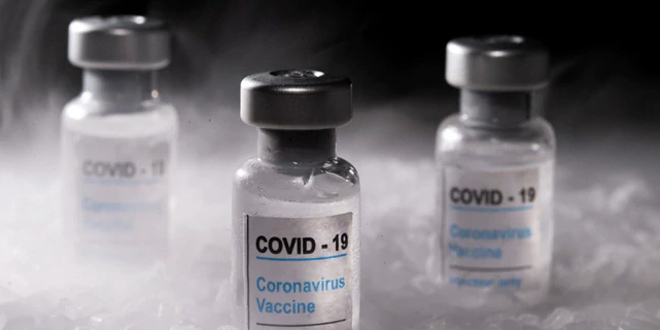Highlights
- India started its COVID-19 vaccination drive on January 16
- 2 vaccines are expected to be approved by India in the few months: Centre
- Will receive a gift of 2 million doses of Covishield from India: Bangladesh
New Delhi: India started delivering coronavirus vaccines to its neighbours on Wednesday (January 20), the foreign ministry said, flagging off a drive to garner goodwill in an often fractious region with the first shipment sent to the tiny Himalayan kingdom of Bhutan. Bangladesh and Nepal said they expected deliveries on Thursday. The only neighbour absent from India’s list apart from China, is regional rival Pakistan, which had not requested assistance, according to an Indian government official.
Also Read: Recipients Will Be Followed-Up For 3 Months After Second Dose Of COVID-19 Vaccine Covaxin: ICMR
Many low and middle-income countries are relying on India, the world’s biggest vaccine maker, for supplies to start COVID-19 immunisation programmes and bring an end to their outbreaks.
“The Pharmacy of the World will deliver to overcome the COVID challenge,” Foreign Minister S. Jaishankar said on Twitter, adding the first vaccine lots had reached Bhutan and the Maldives.
India fulfils commitment to give vaccines to humanity. Supplies to our neighbours will start on 20th January.
The Pharmacy of the World will deliver to overcome the COVID challenge.#VaccineMaitri https://t.co/0pEW52ARe5
— Dr. S. Jaishankar (@DrSJaishankar) January 19, 2021
His ministry said on Tuesday “supplies under grant assistance” would be shipped to Bangladesh, Nepal, Myanmar and the Seychelles also. Shipments to Sri Lanka, Afghanistan and Mauritius were awaiting regulatory clearances.
India authorised two vaccines this month for emergency use at home, one licensed from Oxford University and AstraZeneca and another developed at home by Bharat Biotech in partnership with the state-run Indian Council of Medical Research. Both are manufactured locally.
At least two other vaccines are expected to be authorised by India in the next few months.
India initially will only ship the AstraZeneca vaccine, made by the Serum Institute of India, the world’s biggest vaccine maker, which brands the shot as Covishield.
Bangladesh said it expected to receive a gift of two million doses of Covishield from India on Thursday. The country of more than 160 million has yet to start its vaccination programme and has ordered a further 30 million doses of the shot.
Nepal said it has been pledged one million doses free of charge by India.
Pakistan has approved for emergency use the Chinese Sinopharm COVID-19 vaccine and another developed by AstraZeneca and Oxford University, but has not got any supplies yet.
Also Read: Nasal COVID-19 Vaccine Will Be Easy To Give To Children: AIIMS Director
Vaccine Hesitancy
India, which has reported the highest number of coronavirus infections after the United States, has so far vaccinated 786,842 frontline workers after starting the campaign on Saturday, the federal health ministry said on Wednesday.
The world’s second-most populous country reported on Wednesday 13,823 new cases, taking the total to 10.9 million. The number of deaths from the disease rose by 162 to 152,718, data from the health ministry showed.
The government has urged frontline workers not to refuse the vaccines, after almost all states failed to meet their targets in the first few days of the immunisation drive.
Many people have declined to take the shots, especially the Bharat Biotech vaccine whose efficacy data from late-stage trials are not known, fearing side-effects.
In a survey conducted by New Delhi-based online platform LocalCircles, 62% of 17,000 respondents were hesitant to get vaccinated immediately, mainly due to worries over possible adverse reactions. The government has reported hospitalisation from side effects in only 0.002% of vaccine recipients.
Also Read: UN Agencies Working Closely With India As Country Launches World’s Largest COVID Vaccination Drive
(Except for the headline, this story has not been edited by NDTV staff and is published from a syndicated feed.)
NDTV – Dettol Banega Swasth India campaign is an extension of the five-year-old Banega Swachh India initiative helmed by Campaign Ambassador Amitabh Bachchan. It aims to spread awareness about critical health issues facing the country. In wake of the current COVID-19 pandemic, the need for WASH (Water, Sanitation and Hygiene) is reaffirmed as handwashing is one of the ways to prevent Coronavirus infection and other diseases. The campaign highlights the importance of nutrition and healthcare for women and children to prevent maternal and child mortality, fight malnutrition, stunting, wasting, anaemia and disease prevention through vaccines. Importance of programmes like Public Distribution System (PDS), Mid-day Meal Scheme, POSHAN Abhiyan and the role of Aganwadis and ASHA workers are also covered. Only a Swachh or clean India where toilets are used and open defecation free (ODF) status achieved as part of the Swachh Bharat Abhiyan launched by Prime Minister Narendra Modi in 2014, can eradicate diseases like diahorrea and become a Swasth or healthy India. The campaign will continue to cover issues like air pollution, waste management, plastic ban, manual scavenging and sanitation workers and menstrual hygiene.
[corona_data_new]





























